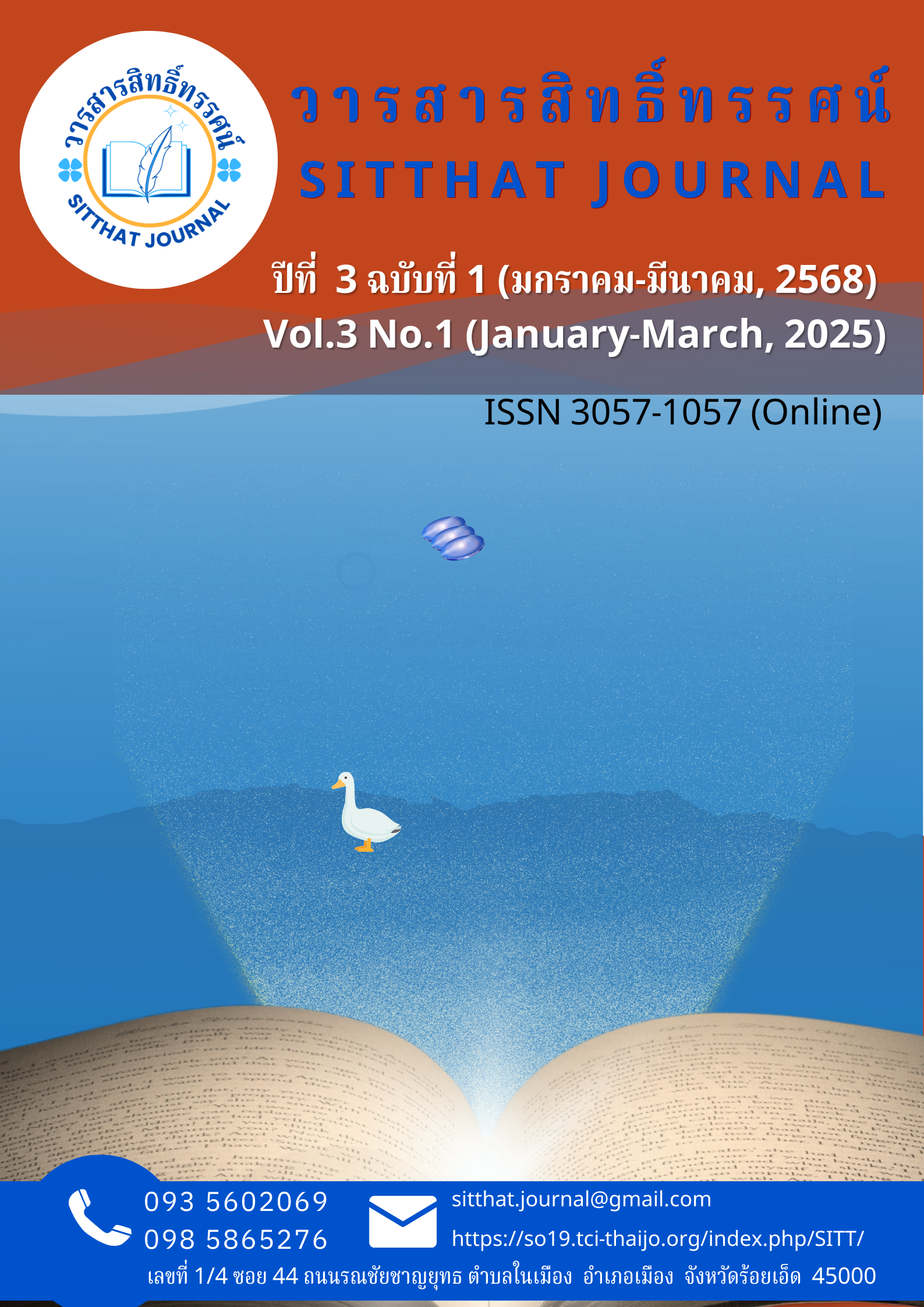GUIDELINES FOR DEVELOPING THE ROLE OF MONKS IN SUKHOTHAI PROVINCE ACCORDING TO MODERN ORGANIZATIONAL MANAGEMENT PRINCIPLES
Main Article Content
Abstract
The objectives of this research are: 1. To study the role and guidelines for developing the role of monks in Sukhothai Province according to the principles of modern organizational management. 2. To study the level of guidelines for developing the role of monks in Sukhothai Province according to the principles of organizational management in the modern new era 3. To suggest guidelines for developing the role of monks in Sukhothai Province according to modern organizational management principles
How to conduct research this research is a mixed method research between quantitative research and qualitative research by using questionnaires and in-depth interview and small group discussions (Focus Group) of key informants by in-depth interviews. One group is a group of experts and has knowledge about Guidelines for developing the role of monks in Sukhothai Province according to modern organizational management principles.
The research results found that
The educational aspect analyzes the guidelines for developing the role of monks in Sukhothai Province according to the principles of modern organization management, as well as the level of guidelines for developing the role of monks in Sukhothai Province according to the principles of modern organization management.
- Studying the guidelines for developing the role of monks in Sukhothai province, emphasizing the importance of disciplinary education in the Pali studies department, such as the 1 Tambon 1 Dhamma scholars Project, and the development guidelines for monastic education are in a good way. This allows monks and novices to receive both worldly and religious education thoroughly.
- Integration aspect of the new era that affects the process and guidelines for developing the role of monks to be convenient in disseminating Dhamma through technology and allowing people to participate in merit thoroughly. By using technology, Buddhists can easily access Dhamma anywhere, anytime. This was a good response, including good cooperation from the Sangha on all sides.
- Organization of administrative competitions for the Sangha Each sub-district By focusing mainly on education such as knowledge and abilities Provide training such as Buddha but Camp and the study of Buddhism on Sundays. Whether it is learning Basic sermon for further future growth and there is online advertising and public relations Original mix and online etc.
- There is promotion and guidance for those with knowledge and ability. Continuing to gain access to the Dhamma at the primary level up to a high level By organizing a training project on the use of online media efficiently To keep up with the modern era according to the situation.
- Guidelines for developing the role of monks according to modern organizational management principles. There are principles of development that are consistent with the times. This causes monks to study and gain more knowledge. To be used in propagating Dhamma in keeping with the times but the elderly monks, they still lack knowledge and understanding of technology. The Sangha has organized a project to promote it. and support education more technology.
- Encourage monks to study additional monastic regulations. According to the principles of modern organization management to have knowledge and understanding in more legal matters. But there is no budget that will support, such as equipment and personnel to promote and transfer knowledge to monks is not enough, etc.
Article Details
References
กัลยา วานิชย์บัญชา.(2560). หลักสถิติ. พิมพ์ครั้งที่7.กรุงเทพฯ: โรงพิมพ์แห่งจุฬาลงกรณ์ มหาวิทยาลัย.
ธัศฐ์ชาพัฒน์ ยุกตานนท์. (2565). “กระบวนการไกล่เกลี่ยข้อพิพาทโดยพุทธสันติวิธี ของศาลเยาวชนและ
ครอบครัวกลาง”. ดุษฎีนิพนธ์พุทธศาสตรดุษฎีบัณฑิต บัณฑิตวิทยาลัย มหาวิทยาลัยมหา
จุฬาลงกรณราชวิทยาลัย.
ธัศฐ์ชาพัฒน์ ยุกตานนท์. (2565). การศึกษาเรื่องปัจจัยที่มีผลต่อผลสัมฤทธิ์ของการเรียนการสอนแบบ
ออนไลน์ภายใต้สถานการการแพร่ของเชื้อไวรัส COVID-1. วารสารสันติศึกษาปริทรรศน์ มจร
(2), 510-565.
พระประวิทย์ ธมฺมวโร (บุญเต็ม). (2562). บทบาทพระสงฆ์กับการมีส่วนร่วมในการพัฒนาชุมชน. บทความวิชาการ สาขาวิชาพระพุทธศาสนา วิทยาลัยสงฆ์นครพนม มหาวิทยาลัยมหาจุฬาลงกรณราชวิทยาลัย.
พระมหาพงศ์ทราทิตย์ ก้องเสียง. (2563). บทบาทที่พึงประสงค์ของพระสงฆ์ไทยในปัจจุบันและอนาคต. วารสารสังคมศาสตร์และมานุษยวิทยาเชิงพุทธ 5(1), 4.
Likert, R. (1932). A technique for the measurement of attitude. Archives of Psychology
: 1-55.
Taro Yamane. (1973). Statistics: an introductory analysis. New York: New York:
Harper & Row.


